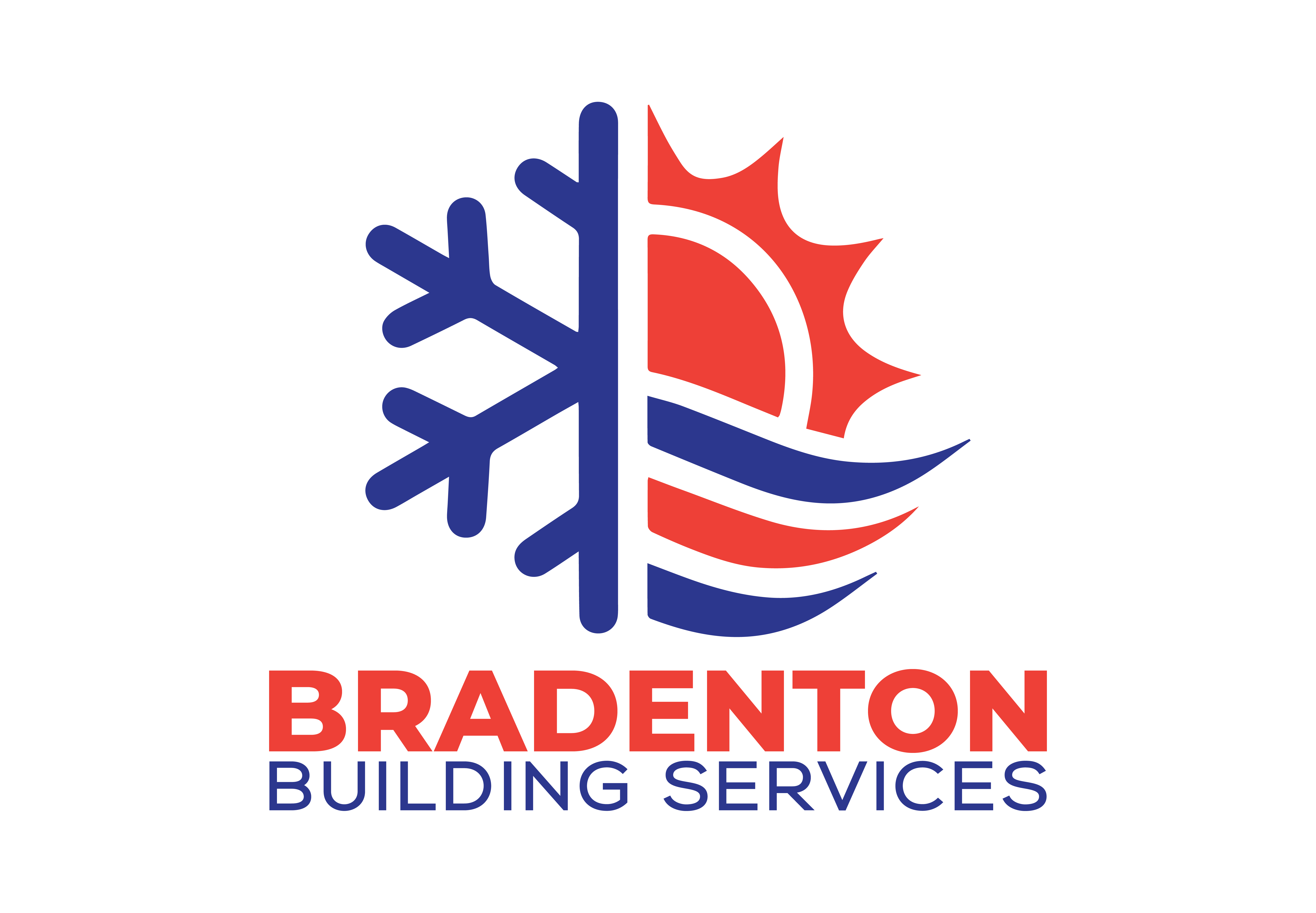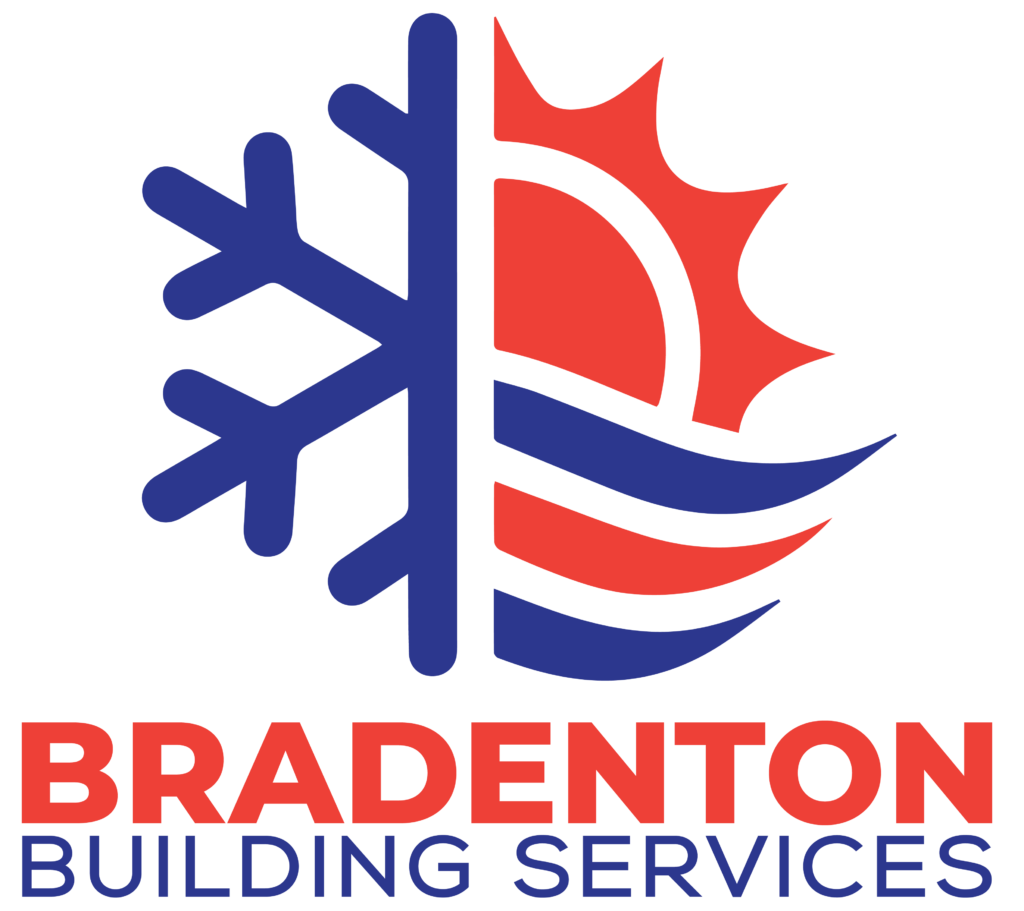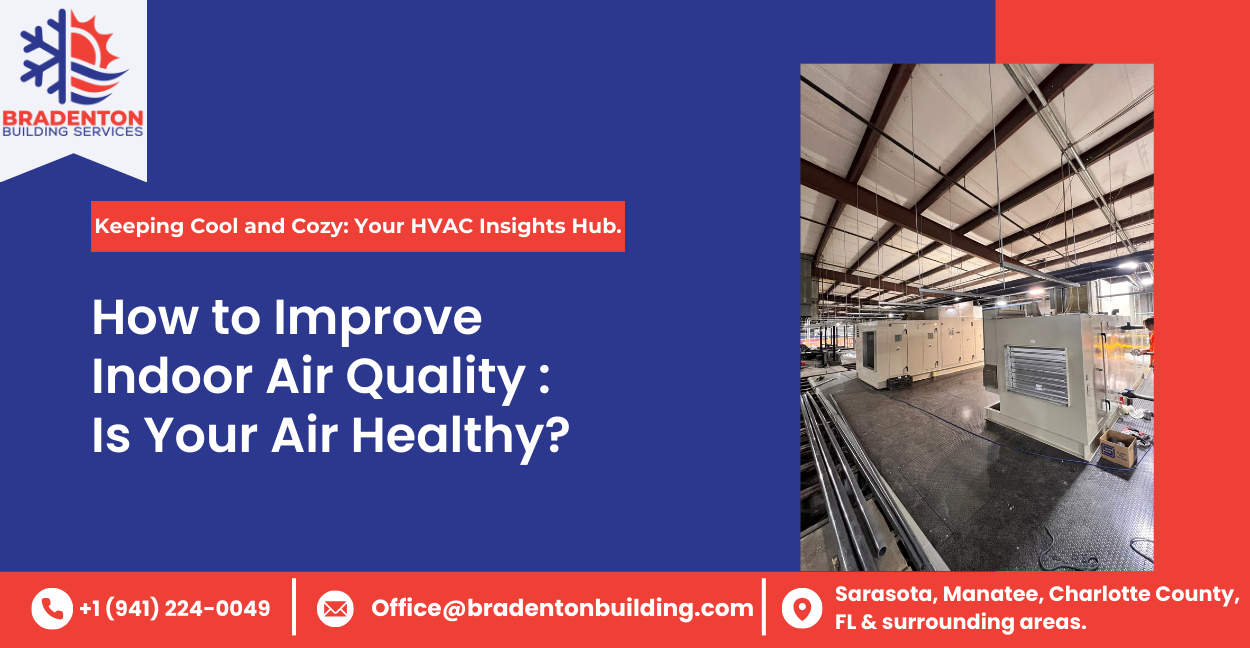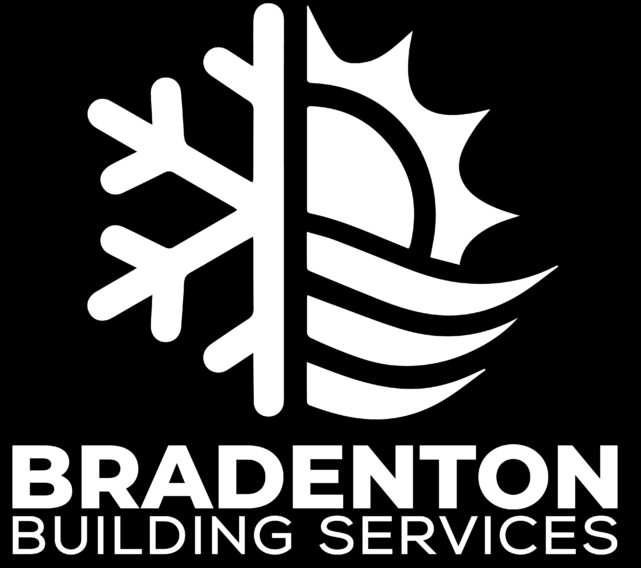Maintaining good indoor air quality is crucial for a healthy and comfortable living environment. The air you breathe inside your home significantly impacts your well-being, affecting everything from your respiratory health to your energy levels. Poor indoor air quality can lead to allergies, asthma, and other health issues. If you’re in Sarasota or Manatee counties, ensuring clean air is even more essential given the area’s humid climate, which can exacerbate issues like mold and allergens. At Bradenton Building Services, we specialize in solutions to help you understand how to improve indoor air quality in your home effectively. In this article, we’ll explore effective strategies to How to Improve Indoor Air Quality in Home identify common pollutants, and discuss the benefits of professional air purification solutions. Let’s dive in and discover how you can create a cleaner, healthier indoor environment for your family.
Understanding Indoor Air Quality
What is Indoor Air Quality?
Indoor air quality (IAQ) refers to the cleanliness and healthiness of the air within your home. It is influenced by the presence of pollutants such as dust, mold, pet dander, and chemical compounds. Maintaining good IAQ means reducing these contaminants, which creates a safer, more comfortable, and healthier environment for you and your family. Especially in areas like Sarasota and Manatee counties, where humidity levels can contribute to air quality challenges, focusing on IAQ is crucial.
Why It Matters for Your Health
The quality of air you breathe directly impacts your health and well-being. Poor IAQ can trigger allergies, worsen respiratory issues, and even contribute to chronic illnesses over time. Vulnerable groups, including children, the elderly, and individuals with pre-existing conditions, are particularly at risk. By improving IAQ, you can minimize health risks, enhance daily comfort, and significantly improve your overall quality of life.
Common Indoor Air Pollutants
-
Dust and Allergens
Dust and allergens are among the most common indoor air pollutants. They accumulate on surfaces and in the air, often causing sneezing, coughing, and itchy eyes. Regular cleaning and vacuuming with HEPA filters can significantly reduce their presence.
-
Mold and Mildew
Mold thrives in humid environments and can release spores that are harmful when inhaled. Sarasota and Manatee counties’ humid climate makes homes particularly susceptible. Using dehumidifiers and fixing leaks promptly can help prevent mold growth.
-
Volatile Organic Compounds (VOCs)
VOCs are chemicals released by household products like paints, cleaning agents, and furniture. These compounds can cause headaches, dizziness, and long-term health issues. Opting for low-VOC products and ensuring proper ventilation can mitigate their effects.
-
Pet Dander
Pet dander consists of tiny skin flakes shed by animals, which can trigger allergies and asthma. Regular grooming of pets and using air purifiers can help manage this pollutant effectively.
Signs of Poor Indoor Air Quality
-
Respiratory Issues
Frequent coughing, wheezing, or shortness of breath can indicate poor IAQ. These symptoms are often mistaken for seasonal allergies or colds but may persist without proper air quality improvements. If left unaddressed, poor air quality can aggravate existing health conditions, making it essential to take corrective measures.
-
Persistent Odors
Unpleasant odors that linger despite cleaning could be a sign of mold, mildew, or VOCs. These odors not only affect comfort but can also indicate serious underlying problems in your home’s air quality. Identifying and addressing the source is crucial for eliminating these smells and improving overall indoor air health.
-
Visible Dust Accumulation
If you notice excessive dust buildup on surfaces or vents, it may indicate inadequate filtration or ventilation in your home. Persistent dust can also suggest problems with your HVAC system, such as clogged filters or dirty air ducts. Regular maintenance and cleaning can significantly reduce dust and enhance air quality.
DIY Solutions to Improve Air Quality
-
Regular Cleaning Practices
Dusting, vacuuming, and mopping are essential to keep pollutants at bay. Use microfiber cloths and vacuums with HEPA filters for the best results. Regular cleaning helps remove dust mites, pet dander, and other allergens, contributing to a healthier indoor environment. Additionally, washing bedding and curtains frequently can further reduce allergen accumulation.
-
Proper Ventilation
Open windows and use exhaust fans to allow fresh air to circulate. This helps dilute indoor pollutants and improves overall air quality. Proper ventilation also helps control indoor temperatures and humidity levels, preventing mold growth and maintaining comfort. Incorporating ventilation strategies can significantly reduce indoor air pollution.
-
Houseplants for Natural Air Purification
Certain houseplants, like spider plants and peace lilies, can naturally filter toxins from the air. Incorporating them into your home decor adds both beauty and functionality. These plants absorb carbon dioxide and release oxygen, improving air quality. Additionally, plants like English ivy and bamboo palm are known for their air-purifying properties.
By implementing these DIY solutions, you can significantly enhance the air quality in your home, leading to a healthier and more comfortable living environment.
Importance of HVAC Maintenance
-
Changing Air Filters
Air filters trap dust, allergens, and other pollutants. Replacing them every 1-3 months ensures your HVAC system operates efficiently and maintains clean air. Neglecting to change filters can lead to reduced airflow, increased energy consumption, and diminished air quality. Regular replacement helps prevent these issues, ensuring optimal system performance.
-
Duct Cleaning Services
Over time, dust and debris accumulate in air ducts, reducing airflow and spreading pollutants. Professional duct cleaning improves system efficiency and IAQ. Clean ducts facilitate better airflow, enhance HVAC performance, and reduce the presence of allergens and mold. Regular duct cleaning is essential for maintaining a healthy indoor environment.
Advanced Air Purification Systems
-
HEPA Filters
High-Efficiency Particulate Air (HEPA) filters capture up to 99.97% of airborne particles. They are ideal for homes with allergy sufferers or pets. HEPA filters effectively remove dust, pollen, pet dander, and other allergens, significantly improving indoor air quality. Installing HEPA filters in your HVAC system can lead to a noticeable reduction in allergy symptoms and respiratory issues.
-
UV Light Systems
UV light systems installed in HVAC units kill bacteria, viruses, and mold spores, providing a healthier indoor environment. These systems use ultraviolet light to sterilize the air, reducing the presence of harmful microorganisms. UV light systems are particularly beneficial in areas with high humidity, where mold growth is a concern. Regular maintenance of these systems ensures their effectiveness in purifying indoor air.
-
Air Scrubbers
Air scrubbers remove contaminants from the air and surfaces, making them a powerful tool for improving IAQ. They utilize advanced filtration and purification technologies to eliminate pollutants, allergens, and odors. Air scrubbers are especially useful in environments with high levels of dust, smoke, or chemical fumes. Incorporating air scrubbers into your HVAC system can lead to a significant improvement in indoor air quality.
Humidity Control
-
Using Dehumidifiers
Dehumidifiers reduce moisture levels, preventing mold growth and improving comfort. They are particularly useful in humid climates like Sarasota and Manatee counties. By maintaining optimal humidity levels, dehumidifiers help prevent the growth of mold and mildew, which can cause health issues and damage to property. Regular use of dehumidifiers contributes to a healthier and more comfortable living environment.
-
Benefits of Proper Humidity Levels
Maintaining humidity levels between 30-50% reduces the risk of mold and dust mites, creating a healthier living space. Proper humidity control also enhances comfort, preserves the integrity of building materials, and reduces the likelihood of respiratory issues. Investing in humidity control measures is essential for maintaining a healthy indoor environment.
Energy Efficiency and Air Quality
-
How Energy-Efficient HVAC Systems Help
Energy-efficient HVAC systems not only lower utility bills but also improve IAQ by maintaining consistent airflow and temperature. These systems are designed to operate more efficiently, reducing energy consumption and minimizing the release of indoor pollutants. Upgrading to an energy-efficient HVAC system can lead to significant cost savings and a healthier indoor environment.
-
Sealing Air Leaks
Sealing gaps around windows and doors prevents outdoor pollutants from entering your home, enhancing IAQ and energy efficiency. Proper sealing also helps maintain consistent indoor temperatures, reducing the workload on your HVAC system and improving overall comfort. Regular inspection and maintenance of seals and insulation are essential for optimal performance.
Benefits of Professional Services
-
Expertise and Equipment
Professional services offer specialized equipment and knowledge to identify and address IAQ issues effectively. Certified technicians can perform comprehensive assessments, recommend appropriate solutions, and ensure proper installation and maintenance of air quality systems. Their expertise ensures that your HVAC system operates at peak efficiency, providing a healthier indoor environment.
-
Long-Term Solutions
Experts provide tailored solutions that address the root causes of poor IAQ, ensuring lasting improvements. They can design customized air quality plans, implement advanced purification technologies, and offer ongoing maintenance services to sustain optimal air quality. Investing in professional services is a proactive approach to maintaining a healthy and comfortable living space.
By implementing these strategies and utilizing professional services, you can significantly enhance the air quality in your home, leading to a healthier and more comfortable living environment.
Choosing the Right Service Provider
-
What to Look for in a Professional Team
Look for licensed, experienced professionals who offer comprehensive IAQ solutions and excellent customer service.
-
Why Choose Bradenton Building Services
Bradenton Building Services combines expertise with state-of-the-art equipment to deliver top-notch IAQ solutions in Sarasota and Manatee counties.
FAQs About Indoor Air Quality
1.) How Often Should I Replace My HVAC Filters?
HVAC filters should be replaced every 1-3 months, depending on factors like usage, pet presence, and allergies. In households with pets or allergy sufferers, it’s advisable to replace filters more frequently, possibly every 1-2 months. Regular filter replacement ensures optimal system performance, improves air quality, and increases the lifespan of your HVAC system by preventing dust and debris buildup.
2.) Can Houseplants Really Improve Air Quality?
Yes, houseplants can absorb toxins like formaldehyde, benzene, and trichloroethylene, and they can help improve indoor air quality (IAQ). While they do contribute to cleaner air, they should be considered as a complement to other air purification methods, such as air purifiers or proper ventilation. Certain plants like spider plants, peace lilies, and snake plants are especially effective at purifying the air, but their impact alone may not be sufficient to address more significant IAQ issues.
3.) What Are the Best Air Purifiers for Allergies?
HEPA (High-Efficiency Particulate Air) filters and air scrubbers are some of the most effective air purifiers for allergy sufferers. These systems are designed to trap particles like pollen, dust, pet dander, and mold spores, which are common allergens. Air purifiers with activated carbon filters can also help remove odors and volatile organic compounds (VOCs). For optimal results, choose a purifier that suits the size of your room and is capable of filtering the specific allergens affecting you.
4.) How Do I Know If My Air Quality is Poor?
Poor indoor air quality (IAQ) can be indicated by symptoms such as frequent allergies, headaches, fatigue, or respiratory issues. You might also notice visible dust accumulation, musty odors, or increased humidity. If you’re experiencing these signs, it’s a good idea to perform an air quality test. Professional testing can pinpoint specific pollutants, including volatile organic compounds (VOCs), mold, or particulate matter, providing a clearer understanding of the air quality in your home.
5.) How to Improve Indoor Air Quality in Home?
To improve indoor air quality in your home, use air purifiers with HEPA filters to remove allergens, dust, and pollutants. Ensure proper ventilation by opening windows and using exhaust fans. Control humidity levels with dehumidifiers to prevent mold growth, and clean regularly to reduce dust and allergens. Additionally, replace HVAC filters frequently and consider adding houseplants to naturally purify the air. Avoid using harsh chemicals or smoking indoors to minimize indoor pollution.
6.) Is Professional Air Quality Testing Worth It?
Yes, professional air quality testing is worth it if you’re concerned about indoor air pollution. Certified professionals can identify specific pollutants that may not be detectable through basic observation, such as harmful gases, mold spores, or invisible particulates. This testing provides actionable insights into the sources of indoor pollution and offers recommendations for improving air quality. If you or your family members suffer from allergies or respiratory issues, this testing can be particularly beneficial.
7.) How Can I Reduce Humidity Levels in My Home?
To reduce humidity levels in your home, use dehumidifiers in areas prone to moisture, such as basements and bathrooms. Fix any leaks promptly, as standing water can contribute to excess humidity. Ensuring proper ventilation, especially in areas like kitchens and bathrooms, helps maintain balanced humidity levels. You can also use moisture-absorbing products like silica gel or activated charcoal to further reduce humidity. In more extreme cases, consider installing a whole-home dehumidifier to manage moisture levels effectively.
Enhance Your Commercial HVAC System with Bradenton Building Services
Looking for reliable commercial HVAC services, air quality solutions, HVAC maintenance, or air filter services in Sarasota and Manatee? Bradenton Building Services has you covered. We specialize in optimizing HVAC systems to ensure comfort, energy efficiency, and healthy air quality for your business.
Our services include:
- Commercial HVAC Services
- Air Quality and Purification Solutions
- HVAC Maintenance
- Commercial Air Filter Services
Contact us today to schedule a consultation and improve your HVAC system’s performance!




